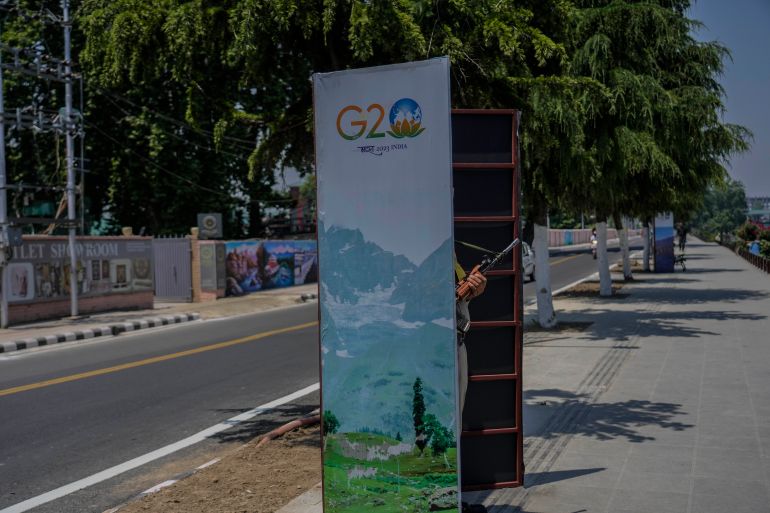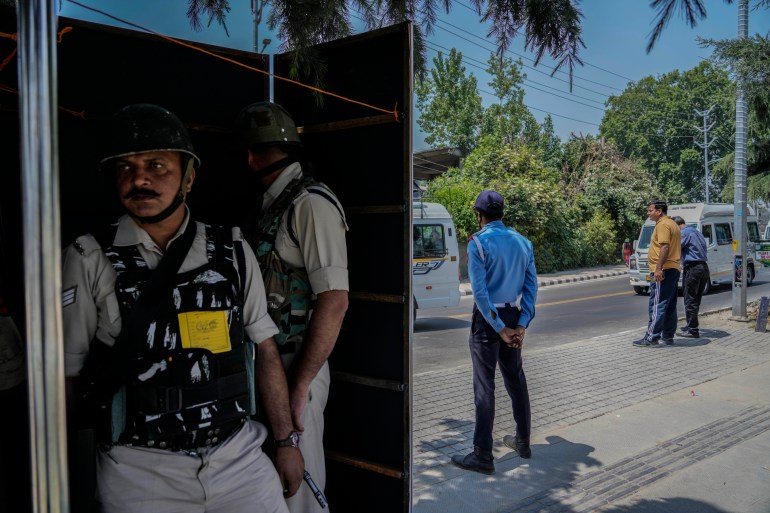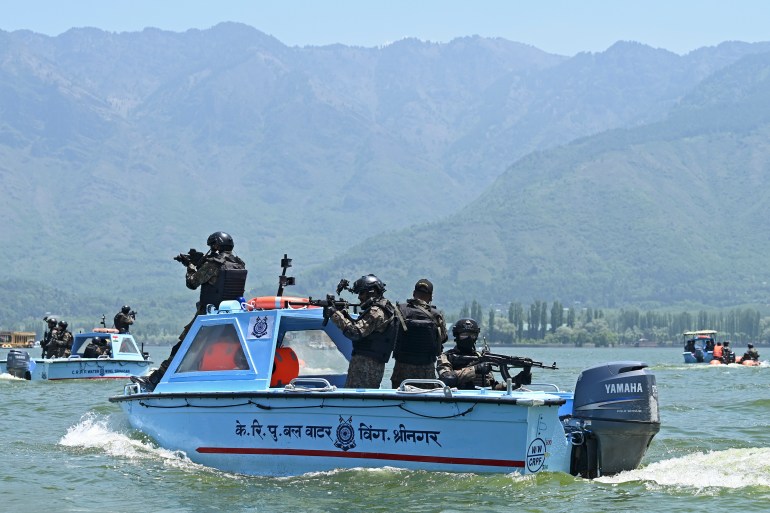India hosts G20 tourism meet in Kashmir under heavy security
It is the first diplomatic event in the disputed region since New Delhi revoked its limited autonomy and took direct control in 2019.

A Group of 20 (G20) tourism meeting is being held in Indian-administered Kashmir amid high security, with China and Pakistan condemning holding the event in the disputed region.
The Himalayan territory of Kashmir is the cause of a dispute between India and Pakistan since their independence 75 years ago. The two nuclear powers – who claim it in entirety but rule over parts of it – have fought two of their three full-scale wars over the territory.
Keep reading
list of 4 itemsChina to boycott G20 meeting hosted by India in Kashmir
India hosting G20 meet in Srinagar an ‘irresponsible move’
India’s G20 meeting ends without consensus on Russia-Ukraine war
The Indian portion of Kashmir, the country’s only Muslim-majority region, has been roiled for decades by an armed rebellion seeking independence or a merger with Pakistan, with tens of thousands of civilians, soldiers and Kashmiri rebels killed in the conflict.
Police said last week that security had been beefed up “to avoid any chance of terrorist attack during the G20” meeting, the first diplomatic event in the disputed region since New Delhi revoked its limited autonomy and took direct control in 2019.

The three-day gathering starting Monday is being held at a sprawling, well-guarded venue on the shores of Dal Lake in the region’s main city of Srinagar.
Roads leading to the location have been black-topped for the occasion, and electricity poles lit up in the colours of India’s national flag to show what officials say is “normalcy and peace returning” to the region.
On Monday, Srinagar appeared calm. Most of the security checkpoints were removed or camouflaged with cubicle-like security posts made of G20 signages behind which security officials stood.
Officials said hundreds of officers were specially trained for what they call “invisible policing” for the event.
‘Normalcy of a graveyard’
But authorities closed the main road leading to the convention centre for civilian traffic and shut many schools in the city.
Mondays’ measures contrasted starkly to the security imposed in the days before the event. A massive security cordon was placed around the venue on the shores of Dal Lake with elite naval commandos patrolling in rubber boats in the water.

India has been promoting tourism in its portion of Kashmir and more than a million of its citizens visited last year.
Indian authorities hope the G20 meeting will show the 2019 changes brought “peace and prosperity” to the region. The delegates will discuss topics such as green tourism and destination management. Side events on ecotourism and role of films in promoting tourist destinations have also been scheduled.
“We have the making of a unique meeting,” India’s chief coordinator for the G20, Harshvardhan Shringla, told reporters on Sunday.
He said the event will have the highest representation of foreign delegates in comparison to previous tourism meetings India held in the states of West Bengal and Gujarat earlier this year.
But Dr Sheikh Showkat Hussain, a political analyst based in the region, told Al Jazeera that for the people of Kashmir, the G20 meeting “would have meant something had there been a normal situation over here”.
“Now, normalcy does not mean normalcy of a graveyard where you have restrictions on media, restrictions on people and people languishing in jails,” he said. “And at the same time you want to project to the world that everything is normal.”
China to boycott
No Chinese delegates will be attending the event.
India and its northern neighbour are locked in a military standoff along their mostly un-demarcated border in the Ladakh region.
Beijing also claims the Indian state of Arunachal Pradesh in full as part of its Tibet province, and it considers Kashmir a disputed territory.
“China firmly opposes holding any form of G20 meeting in disputed territory and will not attend such meetings,” foreign ministry spokesman Wang Wenbin told reporters on Friday.
Turkey, Saudi Arabia and Indonesia are reportedly also unlikely to join, according to a report by the AFP news agency.

India holds the G20 presidency for 2023 and has planned more than 100 meetings across the country.
China has already stayed away from events in Ladakh and Arunachal Pradesh.
Pakistan, a non-G20 member that controls a smaller part of Kashmir, said holding the tourism meeting in the territory violated international law, the United Nations Security Council resolutions and bilateral agreements.
Pakistan’s Foreign Minister Bilawal Bhutto Zardari said last week that India was displaying its “arrogance to the world” and that “it shows their pettiness”, triggering a sharp retort from New Delhi.
India accuses Pakistan of training and supporting armed rebels in Kashmir, which Islamabad denies.
Since India’s 2019 constitutional changes, the rebellion in Kashmir has largely been crushed, although young men continue to join it.
But dissent has been criminalised, media freedoms curbed and public protests limited in what critics say is a drastic curtailment of civil liberties by India.
Last week, UN Special Rapporteur on Minority Issues, Fernand de Varennes, said New Delhi was seeking to use the G20 meeting to “portray an international seal of approval” on a situation that “should be decried and condemned”. India rejected those comments.
Residents have chafed under the stepped-up security measures, hundreds have been detained in police stations and thousands, including shopkeepers, have received calls from officials warning them against any “signs of protest or trouble”.